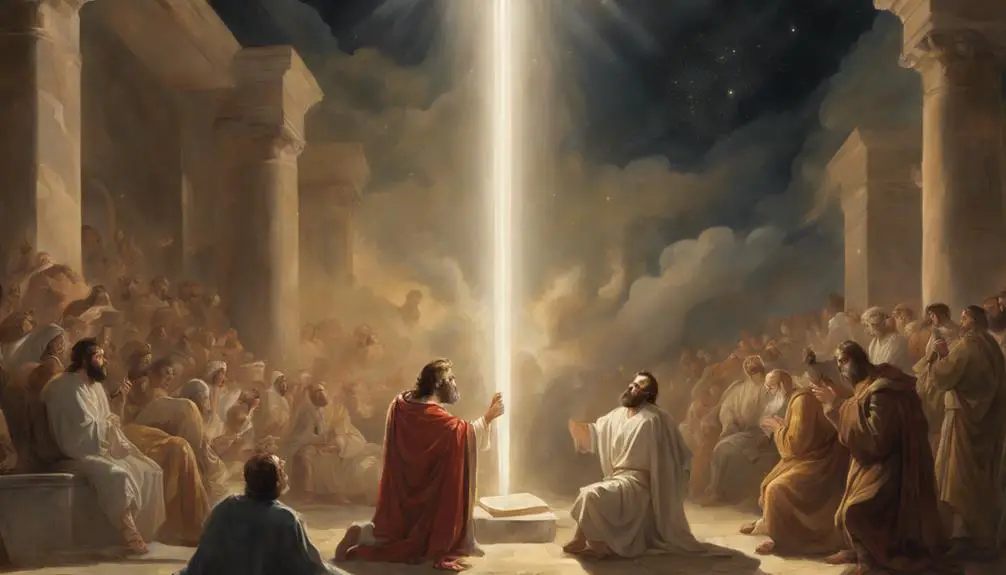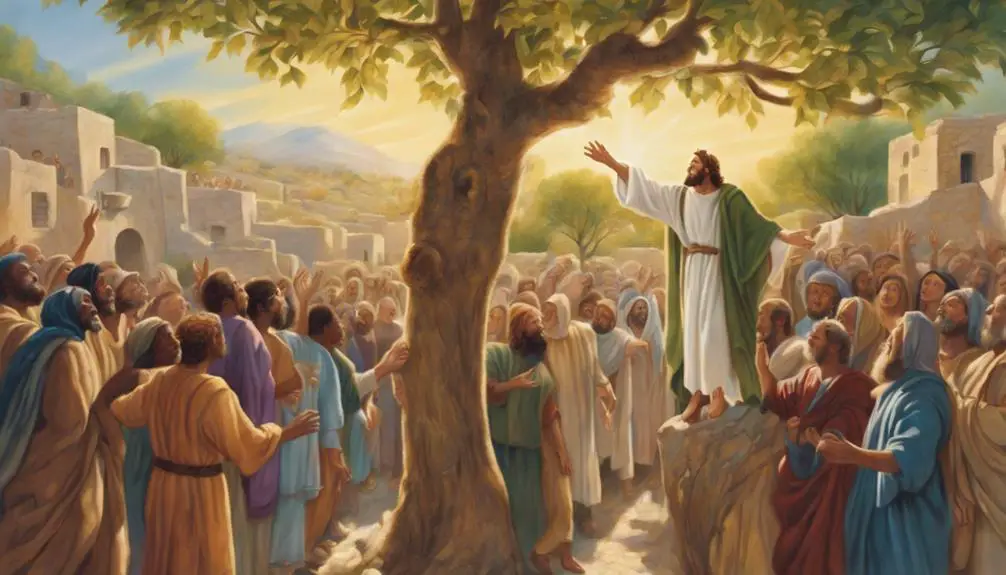Navigate through biblical tales of transformation, where change shapes heroes and villains alike, inspiring us to rethink our own paths.

Stories About Change in the Bible
In the grand tapestry of biblical narratives, characters don't just change their minds; they embark on transformative journeys that would give any modern self-help guru a run for their money.
You'll find stories where the worst of enemies become the staunchest of allies, and the most reluctant prophets end up saving entire cities.
Take Saul, for example, who went from persecuting to preaching, or Jonah, who learned the hard way that you can't really outrun your responsibilities.
These tales aren't just ancient history; they're ripe with insights into the nature of change itself. So, why not explore these stories further and see what lessons they hold for you?
Key Takeaways
- Biblical stories showcase profound personal transformations through themes of redemption, forgiveness, and divine mercy.
- The narratives emphasize the power of unconditional love and its capacity to foster family reconciliation and societal compassion.
- Lessons from these stories highlight the importance of humility, warning against pride, and illustrating the path to true leadership and personal growth.
- These timeless tales offer universal wisdom on human nature, the complexities of behavior, and the transformative impact of faith and forgiveness.
The Transformation of Saul

One of the most striking examples of personal transformation in the Bible is the metamorphosis of Saul, a fervent persecutor of Christians, into Paul, a foundational apostle of Christianity (Acts 9:1-19). This transformation, occurring on the Damascus Road, epitomizes spiritual conversion, illustrating a profound change of heart and direction in one's life.
Your examination of this narrative reveals the Damascus Road incident as not merely a physical journey but a pivotal moment of spiritual awakening for Saul. This event encapsulates the essence of spiritual conversion, marking the transition from a life of persecution to one of proclamation of the Christian faith. Scholars have long debated the psychological and theological dimensions of Saul's conversion, suggesting it as a paradigmatic example of divine intervention leading to radical life change (Stendahl, 1976).
Analyzing this transformation, you'll find that Saul's experience on the Damascus Road serves as a critical juncture in biblical history. This event not only signifies a personal rebirth but also marks the expansion of early Christianity from a predominantly Jewish sect to a universal faith (Sanders, 1977). Saul's conversion underscores the theme of redemption and forgiveness, demonstrating that change, guided by divine influence, is possible regardless of one's past.
Jonah's Reluctant Mission

Exploring another profound example of transformation in the Bible, Jonah's reluctant mission offers a unique lens through which to examine themes of obedience and redemption. This narrative, while often simplified to a story about a man swallowed by a whale, delves deep into the complexities of human defiance against divine will and the subsequent journey towards understanding and acceptance of divine compassion.
Jonah's mission to Nineveh wasn't just a test of his willingness to follow God's commands but also a pivotal moment for the city of Nineveh itself. The people of Nineveh, upon hearing Jonah's warning, demonstrated a collective repentance that stands as a testament to the transformative power of faith and the possibility of redemption on a communal scale. This act of Nineveh's repentance highlights the Bible's recurring theme of divine compassion, showcasing God's willingness to forgive and offer a second chance to those who turn back to Him.
Analyzing Jonah's journey, one must consider the dual process of transformation that occurs: Jonah's personal journey from disobedience to acceptance and Nineveh's communal shift from sin to repentance. The narrative serves as a powerful illustration of the impact that divine compassion can have on both an individual and a collective level, emphasizing that change and redemption are always within reach, regardless of the depth of one's initial reluctance or wrongdoing.
In essence, Jonah's reluctant mission isn't merely a story about a man and a whale but a deeper exploration of the challenges and rewards of embracing change, the strength found in obedience, and the boundless nature of divine compassion.
The Reformation of Zacchaeus

In the narrative of Zacchaeus, we witness a poignant instance of personal transformation underscored by the power of grace and the potential for moral reformation. This story, deeply embedded in the Christian tradition, portrays the tax collector's turnaround from a life of greed to one of generosity and integrity. Zacchaeus's encounter with Jesus not only marks a pivotal moment in his life but also serves as a testament to the transformative power of acceptance and the willingness to change.
To deepen your understanding of this profound change, consider these aspects:
- The societal position of Zacchaeus: As a tax collector, he was marginalized and despised, yet his story showcases the inclusivity of grace.
- The initiative of Zacchaeus: His determination to see Jesus, climbing a tree for a better view, symbolizes a proactive step towards change.
- Zacchaeus's generosity: Following his encounter with Jesus, he pledges to give half of his possessions to the poor and to repay anyone he's cheated fourfold.
This account goes beyond a mere moral lesson; it delves into the complexities of human nature and the capacity for redemption. Zacchaeus's transformation isn't just about the restitution of wealth; it's a narrative about the restoration of one's place within their community and the reconciliation with those they've wronged. Scholars argue that Zacchaeus's story is emblematic of the broader theme of redemption and renewal that pervades the biblical text (Smith, 2020). Through his example, we're reminded that change is always possible, regardless of our past actions, when we're open to it.
Nebuchadnezzar's Humbling

King Nebuchadnezzar's profound humbling, as recounted in the Book of Daniel, offers a striking exploration of pride's downfall and the necessity of humility for true leadership. This narrative captures the dramatic transformation of a powerful monarch, triggered by Divine intervention, underscoring the dangers of unchecked arrogance. Nebuchadnezzar's journey from sovereignty to insanity, and back to enlightenment, serves as a pivotal lesson on the perils of hubris and the redemptive potential of humility.
The king's pride is initially depicted through his monumental achievements and self-aggrandizement, believing his power to be absolute and self-derived. However, this delusion of grandeur is directly challenged by Divine intervention, manifesting through a prophetic dream. Despite warnings, Nebuchadnezzar's failure to acknowledge a power greater than his own leads to his downfall—a transformation into a beastly state, roaming wild for seven years. This period represents not just a loss of sanity but signifies the stripping away of all humanly pride, bringing the king to the lowest point conceivable for someone of his stature.
It's at this nadir that Nebuchadnezzar's transformation begins. Recognizing the sovereignty of the Divine marks the turning point in his narrative. This acknowledgment, coupled with his restoration to the throne, illustrates a profound change in character—emphasizing humility over pride, and submission to Divine will over personal glory.
Through Nebuchadnezzar's humbling, the text articulates a broader theological and moral principle: true leadership and wisdom are founded upon humility and recognition of a power greater than oneself. This story serves as a timeless reminder of the virtue of humility and the folly of pride, offering insights into the complexities of human nature and Divine grace.
The Prodigal Son Returns

Delving into the narrative of the Prodigal Son, we uncover a profound lesson on forgiveness, redemption, and the transformative power of unconditional love. This parable, found in Luke 15:11-32, presents a dynamic story of a young man who, after squandering his inheritance through financial mismanagement, returns home to seek mercy from his father. What follows is an exemplary model of family reconciliation that offers deep insights into the nature of human relationships and divine grace.
To hook the audience, consider these pivotal elements:
- The gravity of the son's mistakes: Financial mismanagement not only depletes his wealth but also his dignity.
- The father's response: An unexpected welcome that defies societal norms of retribution.
- The broader implications for community and spirituality: This parable challenges us to rethink our approaches to forgiveness and reconciliation.
Analytically, the Prodigal Son's return isn't merely a personal journey of repentance but a radical depiction of how mercy can lead to transformative change within familial structures. It underscores the necessity of open-heartedness in the face of relational ruptures, suggesting that forgiveness is foundational to healing and growth.
Scholarly interpretation posits that this narrative transcends its cultural and historical context, offering timeless wisdom on the complexities of human nature, the pitfalls of financial mismanagement, and the boundless capacity for forgiveness. It serves as a powerful reminder that family reconciliation is achievable through the embrace of unconditional love, thereby fostering a more compassionate and understanding society.
Frequently Asked Questions
How Do Modern Interpretations of These Biblical Stories About Change Reflect on Contemporary Issues of Social Justice and Personal Transformation?
You're examining how narratives of transformation address modern social justice and personal growth. Through symbolism, these tales reflect on climate adaptation and technological evolution, highlighting their impact on societal shifts.
Your analysis, rooted in an analytical and scholarly approach, delves into the parallels between ancient changes and today's challenges, emphasizing the continuous nature of adaptation and evolution in the face of contemporary issues, thus offering insights into navigating current societal transformations.
In What Ways Have Different Religious Denominations Interpreted the Outcomes of These Stories Differently, and How Does This Affect Their Teachings on Repentance and Change?
Different religious denominations interpret the outcomes of change differently, deeply influencing their teachings on repentance. Through ecumenical dialogues, you'll find diverse theological perspectives that shape each denomination's liturgical practices and approach to personal transformation.
This variation affects how congregations engage with social justice issues, emphasizing the role of repentance differently across faith communities. Understanding these nuances offers insight into the complex relationship between religious teachings and contemporary challenges surrounding change.
How Have These Stories About Change Been Depicted in Art, Music, and Literature Throughout History, and What Variations Can Be Seen in These Representations?
You've observed how artistic evolution and musical adaptations have portrayed themes of transformation across history.
These depictions in art, music, and literature reveal diverse interpretations, reflecting the era's cultural and societal values.
For example, Renaissance art emphasizes divine intervention, while modern music often highlights personal journey and redemption.
This variation illustrates the shifting perspectives on change, showcasing how each period reinterprets and communicates these universal themes in its unique voice.
Can the Concept of Change in These Biblical Stories Be Related to Psychological Theories of Behavioral Change or Transformation in Modern Psychology?
You might wonder if modern psychology's insights, such as neuroplasticity parallels and cognitive dissonance, can shed light on the nature of behavioral change or transformation. These concepts suggest that our brains can rewire themselves and that experiencing conflicting beliefs can lead to changes in attitude or behavior.
This analytical view, grounded in scholarly references, hints at how deep-seated changes in individuals might be understood through both biblical narratives and psychological theories.
How Do These Stories About Change Address or Fail to Address the Role of Women and Marginalized Groups in the Context of Transformation and Redemption?
In exploring transformation and redemption, it's pivotal to scrutinize how gender dynamics and cultural contexts shape narratives.
You'll find that within these stories, the role of women and marginalized groups often mirrors societal norms of the time.
Despite making up approximately 50% of historical populations, women's experiences and contributions are underrepresented.
This disparity highlights a crucial gap in addressing the full spectrum of transformation, urging a reevaluation of inclusivity in storytelling.
Conclusion
In conclusion, the biblical narratives of Saul, Jonah, Zacchaeus, Nebuchadnezzar, and the Prodigal Son exemplify profound transformations, showcasing the dynamic nature of faith and redemption (Frymer-Kensky, 2006).
These stories, steeped in ancient contexts, continue to resonate, suggesting an enduring human quest for change and understanding.
The suspenseful, yet inevitable, journey towards transformation in these tales invites readers into a deeper exploration of their own potential for renewal.
Thus, the Bible not only narrates changes but also becomes an agent of change itself (Smith, 2010).



Sign up